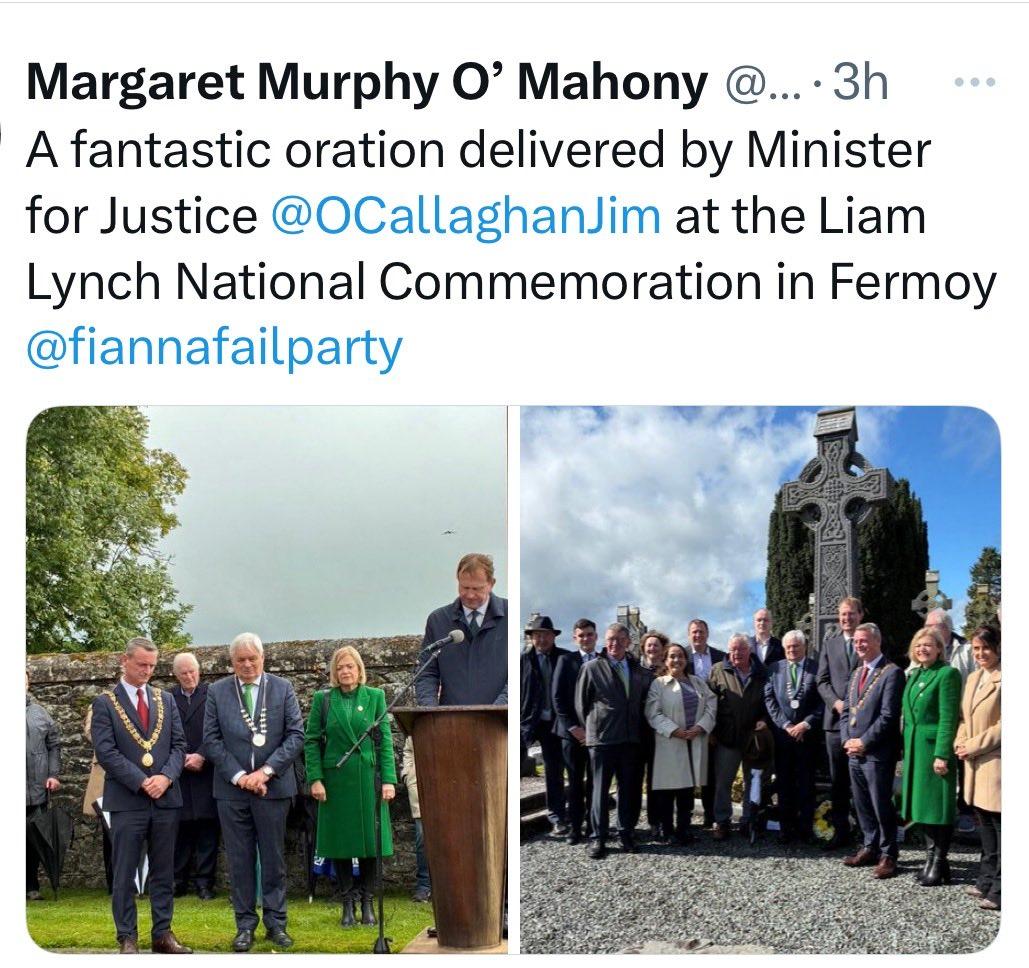Yesterday, Fianna Fáil held its annual Liam Lynch commemoration at Kilcrumper, County Cork. A quaint reminder of times long gone. Lynch was actually a leader of the IRA shot dead in 1923 several years before Fianna Fáil was founded.
No more of a tenuous link I suppose than Fine Gael claiming descent from Collins, the Labour Party from James Connolly, or even the Sinn Féin hagiography of the hunger strikers who whatever they died for it was certainly not to run Northern Ireland through Stormont.
What is more interesting is that the Minister for Justice, Jim O’Callaghan, chose this platform to pump up promised legislation to address apparent delays in the planning process which the Minister described as “abhorrent to the common good.”

The government obviously considers this to be such an important issue that O’Callaghan provided the Sunday Business Post with a preview of his speech, which followed on from an SBP piece last week which stated that all of this is to be addressed in a Civil Reform Bill.
The heads of that Bill have not yet been published and the only reference to it previously by O’Callaghan was in response to a Dáil question by Sinn Féin TD Matt Carthy in May this year. Carthy had asked the Minister about delays to medical negligence claims and O’Callaghan told him that “Work is also ongoing on the preparation of a General Scheme of a Civil Reform Bill to advance other recommendations made by the Review of the Administration of Civil Justice (Kelly Report) which I hope to publish later this year.”
Last week, O’Callaghan also referred to the report by former High Court Justice Peter Kelly as the rationale for the new legislation. That report was published in January 2021 and the most relevant section focused on by the Minister was a recommendation that the State would enact “primary legislation to affect changes to the thresholds for bringing judicial review applications and amendments to the Rules of the Court to ensure a speedy hearing of the proceedings.”
O’Callaghan has claimed that this is necessary in order to facilitate “vital infrastructure projects” and that “the delivery of housing” and others is being delayed or prevented by what he clearly implies are attempts to use the legal process “to delay, obfuscate and undermine” what he described as “vital projects which would benefit our communities.”
The question that must be asked in that case is whether such “vital projects” will include the placing of IPAS accommodation centres in communities where there is clearly opposition, some of which has led to court cases and judicial reviews?
That question has validity because in the Lissywollen case the State has since the beginning of the year been assuring the Court that it was preparing legislation to address the planning issues involved.
Is the proposed Civil Reform Bill that legislation, or part of such a legislative response? Or is it a coincidence that the timeline for the legislation, first mentioned in the Oireachtas on March 19, appears to mirror the State’s response to the case taken against the IPAS centre at Lissywollen. The State first indicated to the High Court in February that they were preparing legislation.
On December 20, 2024, the State had conceded in the High Court that Lissywollen constituted an “unauthorised development.” That ought to have been that, and it was expected that the centre would be ordered by the High Court to be closed.
Instead the State promised the Court in February that it would address the issues raised through new legislation and on July 29 this year it published a General Scheme of a Planning and Development Act (Planning Status of State sites) Amendment Bill.
State Counsel Aoife Carroll notified the High Court of this on July 30 and Justice Emily Farrell adjourned the case until September 26 on the understanding that the legislation will be put before the Oireachtas in the Autumn term which begins on Thursday this week. In the meantime, the centre at Lissywollen has continued to operate.
One view that has been shared with Gript by political and legal sources is that the Civil Reform Bill that has been floated will not directly address the planning issues at the heart of the Lissywollen and other cases taken against accommodation centres. However, the provisions regarding judicial reviews that have been hinted at might set aside any possible recourse to a judicial review of a decision made under existing legislation or under the new Planning and Development Act.
Thus, for example if the State passed the new Planning and Development Act, as outlined in the General Scheme published on July 29, that it would be extremely difficult or even impossible for anyone including a local authority to challenge such a decision by means of judicial review.
The pre-publicity campaign mounted by O’Callaghan and his pejorative references to people who he implies are making “spurious challenges,” and that the proposal is being pitched as a means to speed up the provision of housing, ought to ensure that it be passed with little opposition.
Interestingly the Sunday Business Post reported that one of the aims of the Bill would be to throw out cases in which there was no “reasonable prospect of success at trial.” The State, Dublin City Council and Townbe had based their entire argument in the case taken against the Coolock IPAS proposal on that ground.
The High Court rejected it, but that might become much easier to sustain if the new legislation is passed and circumvents any need to directly address the planning and other issues at stake.
What opposition party or TD will want to be seen as the person who supports holding up the building of houses or factories? On the other hand, ought legislation be passed on that basis only to find that “vital infrastructure” now includes asylum accommodation centres? Or extensive windfarms?
I contacted the Department of Justice to ask whether “the proposals to address current planning legislation and the option of judicial reviews include or apply to objections to IPAS centres, including such as those taken by Westmeath County Councillors?” and if the proposed legislation was part of the State’s undertaking in the Lissywollen case to address the issues raised in this way.
I had received no response prior to publication.

